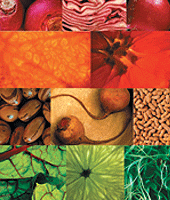The Cancer Food Connection
In the 1980s, the US Surgeon General stated 70 percent of allNorth Americans are dying from diseases directly related to their eating habit.

The most comprehensive study on the cancer/food connection to date is a combined effort of the American Institute of Cancer Research and the World Cancer Research Fund. They undertook a three-year research project in 1997 involving 15 research scientists and medical doctors and 4,500 published
scientific studies from around the world. Some surprising results came from the study, supporting the power of foods.
The panel estimated that healthy diets, together with regular physical activity and appropriate bodymass, could in time reduce cancer incidence by 30 to 40per cent. At current rates, on a global basis, this representsthree to four million cases of cancer per year that could be prevented by a healthy diet and an active lifestyle
Who is at Highest Risk for Cancer?
Those consuming the largest amounts of cancer-promoting foods also have the highest risk of getting cancer. There is a reason that modern societies such as the US, Canada, Australia and the UK have some of the highest cancer rates.
These are the countries that indulge in the most alcohol and processed foods that are high in fats and low in nutrients and fibre. Next at risk are those who have departed from traditional diet and are rapidly adopting the white flour, sugary, high-fat processed foods and drinks of "modern society." This has been shown repeatedly when Asian immigrants move to North America and
start adopting the standard high-fat and low-fibre diet. Even though there has been no change in genetics, the change in diet results in increased cancer incidence amongst this group.
Cancer-Promoting Foods
A diet featuring high cancer-risk foods is often coupled with a diet low in protective foods. First, we need to look at current foods that increase risk. The main diet and lifestyle factors coming from this extensive research are smoking tobacco and consumption of alcohol, meat, saturated
fats and cholesterol, some dairy foods, grilled meats, eggs, sugar and commercially pickled foods. Why do these foods increase risk? Generally, excessive consumption and an increase in toxicity (as from alcohol and tobacco) contribute directly to an increased risk of lung, esophageal and throat cancers plus liver, colorectal, breast, kidney and bladder cancer.
Highly saturated fats from animal products can put the body's hormones out of balance, increasing the risk of hormone-related cancers such as prostate, breast and ovarian cancers. In our modern society, the quality and quantity of these foods need to be assessed. Our commercial meat and animal foods are often produced in a completely unnatural way, resulting in a dramatic reduction in quality. Seeking good quality organic sources, finding more natural dairy processing methods such as fermenting, and incorporating more variety will bring balance back into the North American diet.
Cancer-Preventing Foods
The following food groups have been continually shown to protect against cancer.
Vegetables and fruits are high in antioxidants and flavonoids that stimulate and support the immune system. Aim for freshness, variety and colour. Colourful pigments such as lycopene (found in tomatoes, watermelon and pink grapefruit) and anthocyanin (found in blueberries) provide powerful protection against free-radical damage (damage that can occur at the
cellular and DNA level, initiating cell mutations).
Grains, beans and root vegetables in their whole form contain both soluble and insoluble fibre, which facilitates hormone excretion and decreases the burden of environmental toxins. Grains such as oats, rye, barley, buckwheat and wheat have marked inhibitory effects in the presence of carcinogens due to lignans, which have been shown to be both anti-tumour and antiviral. Nuts and seeds such as flax also have marked protective effects. The essential fatty acids they contain help support the immune system, and they are also a good source of lignans. Even the colour of nut, seed and bean skins have phytochemicals that act as protective agents in our bodies.
Tea is another major protective factor. Green tea in particular contains powerful catechins and ellagic acids that are being studied as factors that reduce tumour growth.
Broccoli, kale, cauliflower and cabbage, known collectively as cruciferous vegetables, contain sulforphane, which assists the liver in a two-part process of breaking down and eliminating carcinogens. The cruciferous vegetables add to the elimination part of the equation; without them, the liver is continually exposed to toxic elements, increasing the risk of cancer.
While cancer is a multi-factorial disease, we do have the opportunity to decrease our risk through our daily food choices. Start to implement easy factors such as ground flax seed on cereals, drink green tea and snack on more fruits and vegetables. Focus on whole grains, beans and vegetables for lunch and dinner, and you'll be loading up on a whole host of protective
elements for your future health.
Top 10 Cancer-Fighting Foods
- Broccoli
- Cabbage
- Ginger
- Carrots
- Green tea
- Grains - oats, rye, barley
- Tomatoes
- Blueberries
- Beans, lentils, and peas
- Brown rice
Top 10 Cancer-Promoting Foods
- Grilled meats - hamburger, steak, chops, chicken, and fish
- Fries
- Milk shakes
- Hydrogenated oils - cakes, cookies, salad dressings, chips, crackers, margarine, frostings
- Alcohol - beer, wine, spirits
- Omelettes
- Commercial cheeses
- Cured meats - luncheon meats, salami, hot dogs
- Pickled foods
- Coffee
The Okinawans, residents of an idyllic island group in Japan, claim to be the longest-lived people in the world. A sample weekend breakfast consists of brown rice, miso soup with seaweed, steamed spinach and jasmine tea. Here in Canada, a sample weekend breakfast consists of waffles, muffins, eggs, baby back bacon, sausage links, maple syrup and coffee. In stark contrast, the Okinawans have 80 percent less breast and prostate cancer and less than half the ovarian and colon cancer of North Americans.
Source: Canadian Cancer Statistics, 2001/2002




